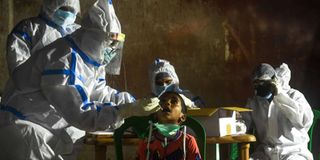Biomonitoring device for virus detection in air, surfaces now in Kenya

A health worker collects a swab sample from a child, resident of a containment zone to test for the Covid-19 coronavirus in Kolkata.
What you need to know:
- The ADC-200 Bobcat, a light-weight, portable, dry filter air sampler for monitoring airborne bacteria, and viruses, including the now vicious novel coronavirus.
- It will enable hospitals and other close quarter habitation areas such as prisons, schools, police stations and military camps to detect presence of viruses in the air or surfaces.
- It uses sterile electret air filter units to collect the virus, bacteria and fungi samples.
A bio-monitoring device for the detection of coronaviruses and other microbial threats in the air and surfaces is now available in Kenya after a medical equipment company secured its distribution deal.
The ADC-200 Bobcat, a light-weight, portable, dry filter air sampler for monitoring airborne bacteria and viruses, including the now vicious Covid-19, runs on battery power or wall power, and suitably samples outdoor or indoor environments in a relatively quiet operation.
Suppliers of biomedical, analytical, and industrial equipment, Lynge Holdings Ltd, who were granted the deal to distribute the device, have begun distributing it.
Janet Sigey, the firm’s sales and marketing director, explained that the device provides simple and straightforward methods for collection and detection of SARS-CoV-2 and other pathogens present in an environment.
“This light-weight, portable, dry filter air sampler is handy in that it can be used to monitor airborne bacteria and viruses, including the now prevalent coronavirus,” she said.
The gadget, she further said, will enable hospitals and other close quarter habitation areas such as prisons, schools, police stations and military camps to detect presence of viruses in the air or surfaces. This offers a key detection mechanism that does away with presumptive diagnoses.
Phased reopening
“There is evidence that Covid-19 has potential to spread through aerosols –particles that remain afloat in the air after an infected person has left the room. Therefore, there is no better time than now to make use of the device,” said Ms Sigey.
She noted that with the existing methods for coronavirus testing and detection being negatively affected by limited collection volumes, poor sample recovery, and complex and difficult to perform recovery processes, the gadget provides simple and straightforward methods for collection and detection of coronavirus contamination and other pathogens at levels which were earlier inconspicuous.
“The air monitoring and testing gadget not only gives surface, fomite, and aerosol contamination measurements but also provides environmental framework implications that can be used to stem the pandemic,” she said.
With the country slowly moving towards phased reopening of the economy including easing travel restrictions enforced to curb the spread of the pandemic, the device is expected to help address gaps in environmental controls and provide proactive air contamination monitoring services.
It uses sterile electric air filter units to collect the virus, bacteria and fungi samples.





